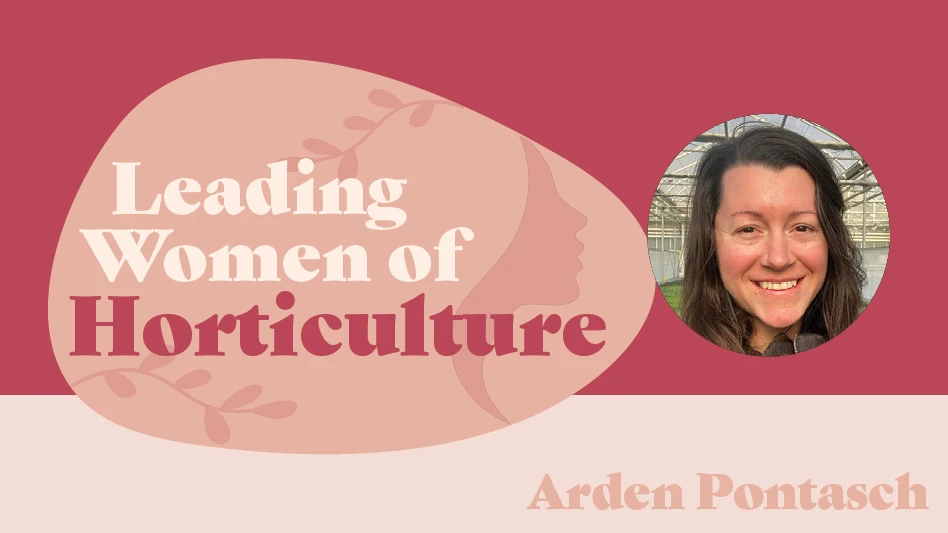 (l-r) Allison Boyd, inventory manager; Kathy Sharp, owner; Mario Caballero, production superintendent.
(l-r) Allison Boyd, inventory manager; Kathy Sharp, owner; Mario Caballero, production superintendent.
Photo by Steve Valentine Kathy Sharp left a nursing career to become a nursery owner. She was teaching nursing at a local university and working as an ER nurse, when someone told her about a potential investment. It was a 200-acre former tree farm overgrown with weeds in Newark, Ill.
“I saw it and loved it,” she said.
She purchased the land, which sat atop the peak of Kendall County, and named her new business Kendall Hill Nursery.
“My husband and I thought we’d have some guy run the place and dig the trees,” she said.
Instead, she went to Joliet Junior College to study horticulture, quit her two jobs and jumped in full force. She hired a salesperson from another nursery and a grower from a nursery that was closing, who brought some labor with him.
“The property was a mess,” she said. “The previous owner had lined it out with tree liners, and probably two years before I bought it, he just let it go. The trees needed so much attention.”
Sharp and her new crew cleaned up the property, which was a “nightmare,” because the 200 acres were a “mish-mash of trees. Nothing was planted in blocks,” she said.
Besides cleaning up the property, Sharp had to correct the previous owner’s mistakes.
“I had to work against the perception of not having quality because of what I had to start with,” she said. “There’s a home for most trees just because price is an issue, and being able to sell a less-than-specimen quality tree by admitting it upfront really helped sales.”
She wanted her company to be known as a top-quality business, and it took her a couple of years to sell everything on the original 200 acres.
She began replanting right away.
“I hired a supervisor to take care of pruning and got everyone on board with evaluating what we were growing,” she said.
Sharp bought lists of landscaper names, and sent post cards with glossy pictures of her trees. That got some local contractors out to the farm to shop.
 New and improved
New and improved
There was an advantage to being a novice. She wasn’t afraid to try to new things. And she didn’t use the phrase, “I can’t do that.”
She also looked to fellow nursery owners to help her learn about the industry.
“I was not afraid to ask questions. My competitors are probably still laughing at my phone calls, ‘Hey, how do you plant your trees? Can I come watch?’”
Sharp made some rookie mistakes, including buying lots of the wrong types of trees.
“I don’t think I was taken seriously at first, especially when I made the wrong buying decisions — but that was when liners were in short supply,” she said. “And it was a great economy then, so the mistakes weren’t detrimental to the business. I learned from my mistakes.”
Sharp had plenty of business acumen she learned from her husband, who had owned businesses since they were married. She had a good understanding of things like contractors and insurance because of a stint as a business manager at a private school. She learned human interaction skills from her nursing career, which really pays off in sales, customer service and employee management.
Expansion mode
By her second year of operation, Sharp bought a 25-acre farm next door, followed by other contiguous tracts.
“Each year we kept moving into new farm ground, which allowed us to use cover crops and rest the first part of the acreage,” she said.
Now Kendall Hill Nursery encompasses more than 700 acres and it’s all planted to Sharp’s specifications. Gone are the mish-mash plantings from 11 years ago.
“The nursery is very organized and we can find anything,” she said.
Sharp’s inquisitive nature not only helped her learn things from fellow growers, but it also allowed her to try growing trees not typically produced in her area. “I like trying new things, and I didn’t let anyone tell me, ‘You can’t grow that here,’” she said.
“I like trying new things, and I didn’t let anyone tell me, ‘You can’t grow that here,’” she said.
Some of her experiments have been pleasant surprises, such as Viburnum plicatum f. tomentosum ‘Mariesii’ and Cornus kousa.
Kendall Hill specializes in what Sharp calls the “bread and butter shade trees for Northern Illinois,” and some natives such as Ostrya virginiana, Carpinus caroliniana, Liriodendron tulipifera, several species of oaks and London planetree.
Sharp concentrates on trees her crew can dig in the fall. She uses test plots for fall digging and planting to observe the trees’ performance.
Kendall Hill Nursery sells trees from 2- up to 5 inch-caliper and shrubs from 15 inches high up to 5 feet high.
Production practices
Five years ago the nursery installed a drip irrigation system which is fed by an 8-acre lake. It’s a self-filtering and self-backfilling system.
The nursery applies pest control sprays on an as-needed basis and uses soaps and oils.
“I want to keep that balance in the environment and soil,” she said.
Sharp has also used predatory mites on maples.
“I have a higher tolerance and patience level than most,” she said. In 2009, Sharp instituted more root pruning in the field. Those trees will be available for summer digging.
In 2009, Sharp instituted more root pruning in the field. Those trees will be available for summer digging.
Sharp’s five-year plan includes reducing the amount of acreage in production.
“I want to shrink the size of the nursery to a more manageable amount while still maintaining our quality. Under 500 acres of production will be plenty,” she said.
She’ll hang on to the land and farm it with crops such as soybeans and
corn.
For more: Kendall Hill Nursery, www.kendallhillnursery.com.

Explore the January 2010 Issue
Check out more from this issue and find your next story to read.
Latest from Nursery Management
- The Growth Industry Episode 3: Across the Pond with Neville Stein
- Trends: Proven Winners 2025 perennial survey shows strong demand
- Online registration opens for the 2025 Farwest Show
- Sustainabloom launches Wholesale Nickel Program to support floriculture sustainability
- Plant breeding as an art
- Society of American Florists accepting entries for 2025 Marketer of the Year Contest
- American Horticultural Society welcomes five new board members
- Get to know Christopher Brown Jr. of Lancaster Farms





